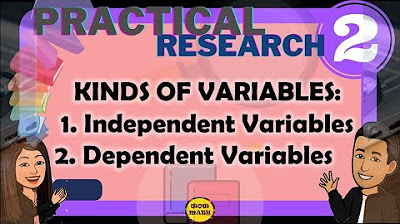Research Variables 101: Dependent, Independent, Control Variables & More (With Examples)
Summary
TLDRThis video explains six key types of research variables: dependent, independent, control, moderating, mediating, and confounding variables. It highlights how independent variables influence dependent ones, the role of control variables in maintaining consistency, and the importance of moderating variables in altering the strength or direction of relationships. Mediating variables bridge causal links between others, while confounding variables can lead to false conclusions if not accounted for. The video offers a clear breakdown of these concepts, with practical examples, and emphasizes the need for careful consideration in research design.
Takeaways
- 📊 Research variables are essential elements in quantitative studies, and understanding them is crucial for drawing accurate conclusions.
- 🔍 The six main types of research variables discussed are dependent, independent, control, moderating, mediating, and confounding variables.
- ⚙️ Independent variables are the cause, while dependent variables are the effect. Changes in the independent variable lead to changes in the dependent variable.
- 🎯 Control variables are held constant by researchers to ensure that they do not influence the outcome of the study.
- 📈 Moderating variables affect the strength or direction of the relationship between the independent and dependent variables.
- 🔗 Mediating variables help explain the relationship between independent and dependent variables, acting as intermediaries.
- ⚠️ Confounding variables are unmeasured factors that can create the false appearance of a causal relationship between two other variables.
- 🧪 Establishing causal relationships between variables often requires experimental research designs with control over the environment.
- 📚 Different terms like 'response variables' and 'outcome variables' are also used for dependent variables, and 'explanatory variables' for independent variables.
- 👨🏫 Identifying and controlling for variables is critical in research to avoid incorrect conclusions, especially with confounding variables.
Q & A
What is a variable in research?
-A variable is any attribute that can change or vary over time. It could be something like dosage of a medicine, age, gender, or ethnicity. Variables are essential in research, especially in quantitative studies, where researchers investigate how one variable impacts another.
What are the 'big three' types of research variables?
-The 'big three' types of research variables are dependent variables, independent variables, and control variables. Dependent variables experience the effect, independent variables are the cause, and control variables are held constant to ensure they do not influence the results.
How is an independent variable different from a dependent variable?
-An independent variable is the cause or factor that researchers manipulate to see its effect, while a dependent variable is the outcome or effect that is measured in response to changes in the independent variable.
What is the purpose of a control variable?
-A control variable is intentionally kept constant in a study to ensure that it doesn't interfere with the relationship between the independent and dependent variables. This helps researchers isolate the effect of the independent variable on the dependent variable.
Can a variable act as both an independent and dependent variable?
-Yes, depending on the research context, a variable can sometimes act as both an independent and dependent variable. Research variables can often have different roles in different studies, adding complexity to research designs.
What is a moderating variable and how does it influence research?
-A moderating variable affects the strength or direction of the relationship between an independent and a dependent variable. It modifies how one variable affects another but doesn't cause the effect itself. For example, age could moderate the impact of sleep deprivation on cognitive performance.
What is a mediating variable, and how does it work?
-A mediating variable explains the relationship between an independent and a dependent variable. For example, in a study on education and income, job skills could mediate the relationship by explaining how higher education leads to higher-paying jobs.
What is a confounding variable, and why is it important to identify it?
-A confounding variable is an unmeasured or untracked variable that can influence the relationship between two other variables, potentially leading to incorrect conclusions about cause and effect. Identifying and controlling confounding variables is critical to avoid drawing misleading conclusions.
Why is it difficult to establish causality between an independent and a dependent variable?
-Establishing causality is difficult because there could be other variables, like confounding or moderating variables, influencing the relationship. Additionally, experimental control over all variables is challenging, making it hard to isolate the independent variable as the sole cause.
How can researchers strengthen their ability to determine causal relationships in a study?
-To strengthen causal relationships, researchers should use an experimental research design, where they control both the environment and the variables of interest. By controlling or eliminating extraneous variables, they can better isolate the effect of the independent variable on the dependent variable.
Outlines

This section is available to paid users only. Please upgrade to access this part.
Upgrade NowMindmap

This section is available to paid users only. Please upgrade to access this part.
Upgrade NowKeywords

This section is available to paid users only. Please upgrade to access this part.
Upgrade NowHighlights

This section is available to paid users only. Please upgrade to access this part.
Upgrade NowTranscripts

This section is available to paid users only. Please upgrade to access this part.
Upgrade NowBrowse More Related Video

Types of Variables: Dependent, Independent, Moderating, Mediating & Control Variable

Types of Variables in Research and Their Uses (Practical Research 2)

Developing the Conceptual Framework

INDEPENDENT AND DEPENDENT VARIABLES || PRACTICAL RESEARCH 2

Research Variables l Bibbo Project

Jenis Data & Variabel : Metodologi Penelitian
5.0 / 5 (0 votes)